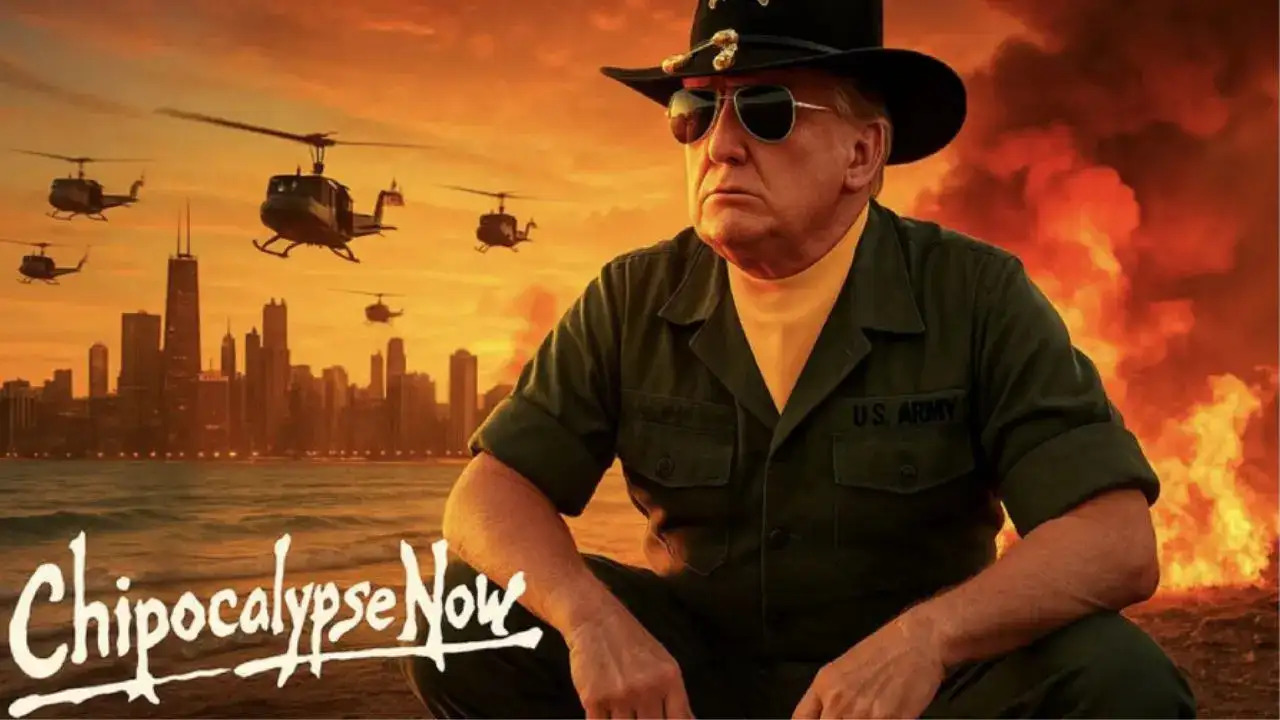
Robert Draws – Trump’s Chicago Meme has sparked fierce backlash after the former president posted a digitally altered image portraying himself as a war commander targeting the city. Styled after the Vietnam War film Apocalypse Now, the meme shows Trump in military fatigues with helicopters flying over a burning Chicago skyline. The post included a provocative caption that referenced deportations and hinted at the use of federal force. The image was clearly designed to stir controversy and draw attention, especially among his political opponents.
Within hours of the post, Illinois Governor JB Pritzker and Chicago Mayor Brandon Johnson condemned the meme as an outright threat. They viewed the post as more than internet bravado and instead saw it as a signal of Trump’s intent to mobilize federal troops without local consent. The timing of the meme also coincided with Trump’s executive order renaming the Department of Defense, further intensifying speculation that real deployment plans could be underway.
The fallout from Trump’s Chicago Meme was immediate, with prominent Democrats voicing concern over its tone and potential implications. Governor Pritzker described the meme as a threat to American cities, criticizing Trump for using authoritarian imagery to provoke fear. In direct response, he urged citizens not to be intimidated and labeled Trump as a scared man attempting to play strongman politics. Chicago Mayor Brandon Johnson also pushed back, stating that the post revealed Trump’s desire to occupy the city and undermine constitutional principles.
He argued that the meme reflected a deeper authoritarian mindset that poses a threat to democracy. The meme, widely shared across social media, depicted Trump as a rogue commander under the headline Chipocalypse Now, playing on the name of the city and the famous war film. With this imagery, Trump reignited debates about the balance between federal authority and local governance. Democrats across Illinois unified in opposition, calling the meme an insult to American values.
“Read about: Royal Family in Mourning: The Duchess of Kent Dies Peacefully at 92”
The post revived ongoing discussions about Trump’s push to deploy the National Guard in cities with high crime rates. Trump has long argued that cities like Chicago need stronger federal intervention to restore order, citing crime statistics and border-related concerns. His administration has previously sent federal officers to cities such as Washington D.C. and Los Angeles to protect property and escort immigration agents.
However, these deployments typically require either local approval or are limited to federal jurisdiction. Trump’s Chicago Meme seemed to suggest he would bypass traditional protocols and act unilaterally. This implication raised alarms among legal experts and public officials who fear such a move would break constitutional norms. The military-themed post also hinted at broader plans, aligning with Trump’s executive order to rebrand the Pentagon as the Department of War. By blurring the lines between political messaging and military symbolism, the meme created unease about Trump’s future intentions if reelected.
“Read more: Is Your Garage Door Ready for Extreme Weather? What Experts Don’t Want You to Know!”
Many critics focused on the meme’s use of dramatic and violent war imagery to make a political point. In the post, Trump appeared in the likeness of Lt. Col. Bill Kilgore from Apocalypse Now, surrounded by helicopters and flames above a Chicago skyline. Observers noted that this portrayal was not just theatrical but also deeply troubling, given the implications of military force within American cities. Senator Dick Durbin, speaking at a local event, called the post disgusting and inappropriate for any leader.
He emphasized that the suggestion of turning Chicago into a war zone crossed a dangerous line. The meme also angered community leaders and residents who felt that the city was being used as a prop in Trump’s political theater. While Trump’s use of memes is nothing new, critics said this post pushed boundaries in a way that should concern all Americans. The symbolism of the image touched a nerve that remains raw in communities already grappling with violence.
Trump’s meme and military language arrived during ongoing debates about crime in Chicago. The city reported 573 homicides in 2024, maintaining its grim reputation as the U.S. city with the most murders for the 13th straight year. Although some crime indicators showed improvement, overall rates remain above pre-pandemic levels. Aggravated assaults dropped 4 percent year-over-year, but the number still stands higher than in 2019.
Gun assaults declined by 15 percent, yet remain 5 percent above the same baseline. Carjackings fell by 32 percent, but they too are 25 percent higher than in 2019. These mixed results have opened the door for political figures like Trump to argue for federal intervention. Supporters of Trump believe his meme is a justified response to chronic violence, while opponents view it as an exploitation of suffering for political gain. The conversation around crime has become deeply partisan, with Trump’s meme turning statistical debates into visual warfare on social media.